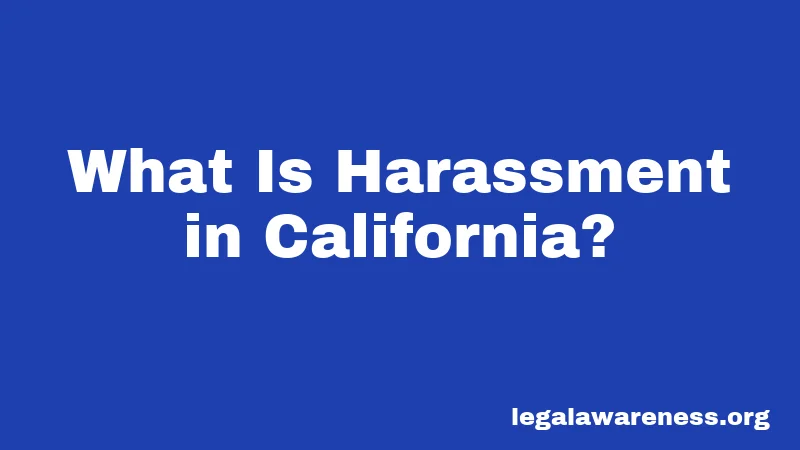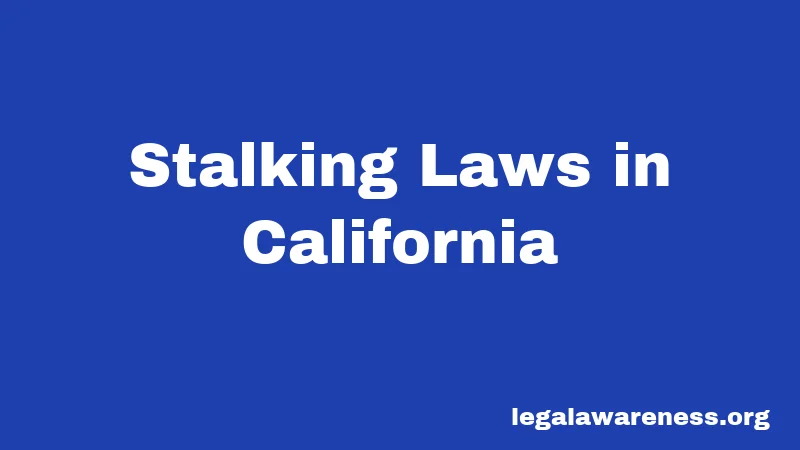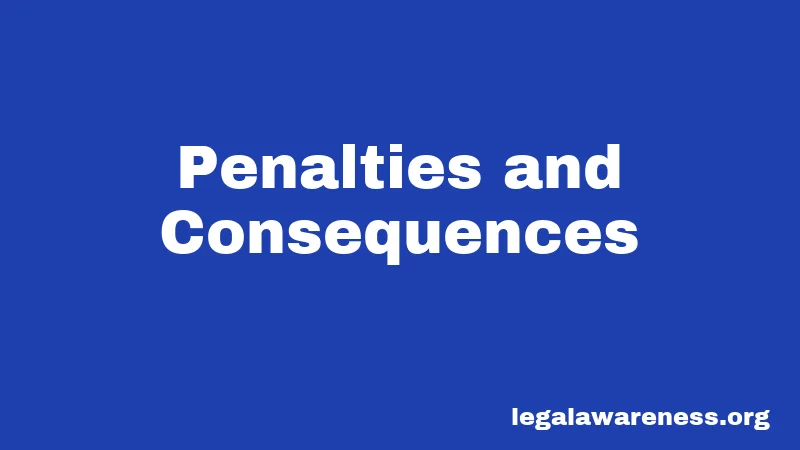Harassment Laws in California (2026): What You Actually Need to Know
Most people have no idea how strict California’s harassment laws really are. Seriously. If you’re being harassed—or worried you might be—you need to understand the rules. Let’s break down exactly what’s legal and what isn’t.
What Is Harassment in California?

Here’s the thing: harassment in California is different from what you might think. It’s not just mean comments. It’s a pattern of behavior that’s designed to alarm, annoy, or scare someone.
According to California law, harassment means engaging in a knowing and willful course of conduct directed at a specific person that seriously alarms, annoys, torments, or terrorizes them. The key word? Pattern. You need repeated acts, not just one bad day.
Basic Harassment Laws in California
What Counts as Harassment?
Wondering what actually qualifies as harassment? Let me break it down.
California law covers a lot of ground. Sending repeated unwanted messages counts. Following someone counts. Making threats counts. Even posting someone’s personal information online to scare them counts. The behavior has to happen more than once and show that you’re doing it on purpose.
Here’s what you need to know: it doesn’t have to be physical. Harassment can be verbal, written, electronic, or even implied through your actions. A text message chain. An email campaign. Comments on social media. Showing up at someone’s house repeatedly. All of these can be harassment if they follow the pattern.
The Pattern Requirement
This is important. You can’t just do something once and get charged with harassment. The law requires “a course of conduct,” which means two or more acts happening over some period of time. The acts have to show you had a continuous purpose in mind.
Think of it like this: sending one angry text is not harassment. Sending twenty angry texts over a week, designed to scare someone, is.
The law is pretty clear: your behavior has to seriously alarm, annoy, torment, or terrorize the person. And it has to serve no legitimate purpose. If you’ve got a good reason for your actions, you might be okay. But if you’re just trying to mess with someone? That’s crossing the line.
Stalking Laws in California

Now, here’s where things get serious. California has separate, strict stalking laws. Honestly, this is probably the harassment law that gets prosecuted the most.
Stalking happens when you willfully, maliciously, and repeatedly follow or harass someone AND make a credible threat that puts them in reasonable fear for their safety. The threat part is critical. Without it, it might just be harassment. With it, it becomes stalking.
Stalking includes following someone in person or online. Sending repeated messages. Showing up at their workplace or home. Using technology to track them. Impersonating them online. The list goes on.
Stay with me here. A credible threat is one that actually scares the person and seems like you could carry it out. It can be made verbally, in writing, or electronically. It can even be implied by a pattern of behavior. You don’t need to say “I’m going to hurt you.” Your actions alone can create a credible threat.
Cyberstalking
Not sure what counts as cyberstalking? Let me explain.
Cyberstalking is basically stalking using the internet or electronic devices. Email harassment. Text message threats. Social media posts designed to scare someone. Posting their address online. Sending nude images without consent. All of these are cyberstalking.
The law treats cyberstalking the same as traditional stalking. It doesn’t matter if you’re behind a screen. The penalties are the same.
Workplace Harassment Laws in California
Here’s a major update for 2025: California expanded workplace harassment protections. As of January 1, 2025, employers can now seek restraining orders against harassment that might not involve threats of violence.
Under a new law called Senate Bill 428, employers can protect employees from “harassment” in situations where someone’s conduct is “a knowing and willful course of conduct directed at a specific person that seriously alarms, annoys, or harasses the person, and serves no legitimate purpose.” The conduct has to cause substantial emotional distress.
Why does this matter? It means employers don’t have to wait for violence to happen. They can stop harassment earlier. They can file for a temporary restraining order (TRO) that legally prohibits the harassing behavior.
Training Requirements
California employers have mandatory harassment prevention training requirements. If your company has five or more employees, everyone needs training. Supervisors must get two hours every two years. Regular employees need one hour every two years.
The training has to cover sexual harassment prevention AND general harassment prevention. It also has to include information about harassment based on gender identity, sexual orientation, and gender expression.
Pretty straightforward. Employers take this seriously because they can be held liable if harassment happens and they didn’t take reasonable steps to prevent it.
Recent Changes to Workplace Sexual Assault Claims
Okay, this one’s important. As of January 1, 2026, there’s a two-year window for workplace sexual assault victims to file civil claims. This is new. Previously time-barred claims can now be filed through December 31, 2027.
The law also covers related claims like wrongful termination or workplace harassment connected to the sexual assault. This is a big deal for survivors who thought their time to pursue justice had passed.
Penalties and Consequences

So what happens if you’re charged with harassment in California? The penalties can be serious.
For basic harassment that doesn’t involve threats, you could face a fine or jail time. But stalking? That’s where penalties get real.
Misdemeanor Stalking
If you’re convicted of stalking as a misdemeanor, you’re looking at:
Up to one year in county jail. A fine up to $1,000. Or both jail time and a fine.
This seems heavy, honestly. But California views stalking as a serious crime.
Felony Stalking
Felony stalking has much harsher penalties. You could face up to five years in state prison. A fine up to $10,000. Or both.
The offense becomes a felony automatically if:
You violated a court protective order while stalking. You have a previous stalking conviction. You stalked someone after being convicted of domestic violence, criminal threats, or certain other felonies.
If a court order was in effect and you violated it while stalking, you’re looking at two to four years in state prison. No exceptions.
Sex Offender Registration
Here’s the part that really sticks with people. If you’re convicted of stalking as a felony, the court can order you to register as a sex offender under California law. This follows you for life. It’s a permanent consequence.
The court can make this order if the stalking was sexually motivated or for sexual gratification.
Special Circumstances and Exceptions
Wondering if this applies to you? Not sure if your situation is different?
Constitutionally Protected Activity
You’re not guilty of stalking if you were engaged in constitutionally protected activity. Labor picketing is protected. Peaceful protesting is protected. Legitimate journalism is protected. News gathering is protected.
This is a real defense. If you were exercising your First Amendment rights, stalking charges might not stick. But the burden is on you to prove it.
Harassment Without a Threat
Here’s where it gets technical. You can be prosecuted for harassment even without making a threat. You just need the pattern of conduct that seriously alarms or annoys someone.
But here’s the difference: harassment without a threat is typically a lesser charge than stalking. The penalties are lighter. The stigma is less. Still serious, but less serious than stalking.
Threatening Without a Pattern
On the flip side, you can be prosecuted for making criminal threats even if you never follow up with a pattern of harassment. One serious threat can be enough.
Under Penal Code 422, making a threat to commit a crime that would cause death or great bodily injury is illegal. You don’t need to intend to carry out the threat. You just need to intend for the victim to take it seriously.
How to Protect Yourself
You’re not alone if you’re being harassed. Don’t just hope it stops.
Document Everything
Start keeping records right now. Save screenshots of messages. Write down dates and times of incidents. Save emails. Document any in-person encounters with dates and details.
Your documentation is evidence. Courts love evidence. Honestly, this is the most important thing you can do.
Get a Restraining Order
California courts can issue restraining orders to protect you from harassment. You can file for a civil restraining order (also called a protective order) without going through criminal court.
Contact your local courthouse or a legal aid organization. They can help you understand the process. The order tells someone to stop contacting you and stay away from you. If they violate it, that’s a separate crime.
Report to Police
File a police report with your local law enforcement. Get a case number. This creates an official record. It helps if you later need to pursue criminal charges or a restraining order.
Police can investigate and potentially press charges on behalf of the victim. You don’t have to pursue criminal charges yourself—the state can do it.
Tell Your Employer
If workplace harassment is happening, tell your employer. Tell your manager, your HR department, or your company’s designated reporting contact. Put it in writing.
California law requires employers to take “reasonable steps” to prevent and correct harassment. If you don’t report it, the employer might not be able to help. If you do report it and nothing changes, that’s potentially illegal on your employer’s part.
Seek Legal Help
Consider contacting an attorney who specializes in harassment or restraining orders. Many lawyers offer free consultations. Legal aid organizations can help if you can’t afford a lawyer.
A lawyer can advise you on your specific situation, help you file for a restraining order, or represent you in court. Don’t try to handle serious cases alone.
Frequently Asked Questions
Does harassment have to involve physical contact? No. Harassment can be verbal, written, electronic, or even implied through actions. You don’t need to touch someone to harass them.
Can I be arrested for texting someone repeatedly? Yes, if the texts are harassing and part of a pattern designed to alarm or scare someone. One text is probably not enough. A barrage of threatening texts definitely is.
What if I didn’t intend to scare someone? Your intent doesn’t matter as much as the effect. If your actions made someone reasonably fear for their safety, and you knew (or should have known) that would happen, you can still be prosecuted.
Can someone get a restraining order against me without going to court? No. Temporary restraining orders can be issued quickly without a full hearing, but you’ll get a chance to respond. A permanent restraining order requires a court hearing where you can defend yourself.
How long does a harassment conviction stay on my record? In California, it stays on your record. You can petition to have it dismissed or reduced after certain time periods, but it doesn’t automatically disappear.
Can I be sued for harassment in civil court even if not charged criminally? Yes. Someone can sue you for damages from harassment in civil court even if criminal charges were never filed. The standards are different. Civil court is easier to win in. You could end up owing money.
What if the person is making false accusations? If you genuinely did nothing wrong, that’s a defense. But false accusations are serious too. If someone files a false report against you, you could potentially press charges against them. Talk to a lawyer about your options.
Final Thoughts
California takes harassment seriously. Really seriously. The laws protect people from repeated, deliberate behavior designed to scare them or mess with their lives. The penalties are real. Jail time. Fines. Sex offender registration. Criminal records.
But here’s the good news: you have options. If you’re being harassed, document everything and reach out for help. If you’re worried you might be harassing someone, stop now. Talk to a lawyer about your situation.
The key takeaway? Don’t think of harassment as just annoying behavior. Think of it as a crime. Treat it that seriously, and you’ll make better decisions.
Now you know the basics. Stay informed, stay safe, and when in doubt, talk to a lawyer. They can give you specific advice for your situation.
References
- California Penal Code § 646.9: Stalking Law – https://leginfo.legislature.ca.gov/faces/codes_displaySection.xhtml?lawCode=PEN§ionNum=646.9
- California Code of Civil Procedure § 527.8: Workplace Violence Restraining Orders – https://leginfo.legislature.ca.gov/faces/codes_displaySection.xhtml?lawCode=CCP§ionNum=527.8
- California Senate Bill 428 (2024): Workplace Harassment Restraining Orders – https://leginfo.legislature.ca.gov/faces/billNavClient.xhtml?bill_id=202320240SB428
- California Fair Employment and Housing Act (FEHA) – https://leginfo.legislature.ca.gov/faces/codesTOCSelected.xhtml?code=GOVCODE&division=2.6.&title=&part=2.8.&chapter=5.&article=
- California Department of Fair Employment and Housing (DFEH) 2025 Harassment Prevention Guide – https://dfeh.ca.gov/
- California Civil Rights Department Harassment Prevention Guidelines – https://crd.ca.gov/
- Assembly Bill 250 (2023): Revival of Sexual Assault Claims – https://leginfo.legislature.ca.gov/faces/billNavClient.xhtml?bill_id=202320240AB250
- California CalChamber Harassment Prevention Training Requirements – https://www.calchamber.com/california-labor-law/harassment-training
- San Francisco District Attorney: Stalking and Harassment Resources – https://sfdistrictattorney.org/
